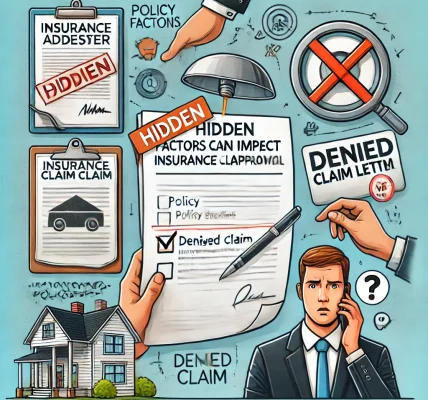When it comes to insurance, most policyholders focus on premiums, deductibles, and coverage limits. However, one factor that often goes unnoticed is credit score. Insurance companies use credit scores as part of their risk assessment process, which can affect policy approvals, premiums, and even claims processing.
Understanding the connection between your credit score and insurance claims can help you make informed financial decisions, improve your insurance standing, and avoid unexpected setbacks. In this guide, we will explore how credit scores influence insurance claims and what you can do to maintain a strong financial profile.
What is a Credit Score and Why Does It Matter?
A credit score is a numerical representation of your financial responsibility, determined based on factors like payment history, debt levels, and credit utilization. It ranges between 300 and 850, with higher scores indicating better creditworthiness.
Insurance providers consider credit scores because studies suggest a correlation between low credit scores and a higher likelihood of filing claims. This risk-based assessment influences:
- Premium rates (higher risk means higher costs)
- Policy eligibility (some insurers may deny coverage based on credit score)
- Claims approval and payout process
Why Do Insurers Use Credit-Based Insurance Scores?
Insurance companies use a variation of the standard credit score known as a credit-based insurance score (CBIS) to predict the probability of a policyholder filing a claim. This score differs slightly from a traditional credit score as it focuses on financial behavior patterns that impact risk.
Key factors in a credit-based insurance score include:
- Payment history (on-time vs. late payments)
- Outstanding debt (high balances may indicate financial instability)
- Length of credit history (longer history can be favorable)
- Types of credit used (credit cards, loans, mortgages, etc.)
- Recent credit inquiries (multiple applications in a short period can signal financial distress)
How Credit Scores Affect Insurance Claims
1. Premium Costs and Policy Approvals
Insurance providers view lower credit scores as a sign of higher financial risk, which can lead to:
- Higher premiums – Poor credit may result in increased insurance rates.
- Policy denial – Some insurers may reject applicants with very low credit scores.
- Stricter terms – Policies may come with higher deductibles or exclusions.
2. Claim Processing Time
When you file an insurance claim, your credit score may influence how quickly it gets processed. Insurers may:
- Conduct additional risk assessments for claimants with lower scores.
- Take more time to investigate fraud risks or financial inconsistencies.
- Offer lower settlements or scrutinize claims more rigorously.
3. Payout Amounts and Dispute Handling
If an insurer deems a policyholder high-risk based on their credit score, it may impact claim payouts. A lower credit score may lead to:
- Lower settlement offers due to perceived financial instability.
- More disputes or denials requiring additional proof of loss.
- Delays in reimbursement, leading to financial strain for the policyholder.
4. Renewal and Future Coverage Implications
After filing a claim, insurers reassess policyholders for risk. If you have a low credit score and have recently filed a claim, you may face:
- Premium increases upon renewal
- Non-renewal or policy cancellation
- Difficulty switching insurers, as other companies may also review credit scores
How to Improve Your Credit Score to Benefit Your Insurance Claims
Since your credit score can significantly impact your insurance costs and claim experience, improving your financial standing is crucial. Here are some effective strategies:
1. Pay Bills on Time
- Late payments negatively affect both traditional and credit-based insurance scores.
- Set up auto-payments or reminders to avoid missed deadlines.
2. Reduce Outstanding Debt
- Keep your credit utilization below 30% of your total credit limit.
- Pay down high-interest debts first to improve your credit profile.
3. Avoid Multiple Credit Applications
- Hard inquiries from loan or credit applications can lower your score.
- Apply for new credit only when necessary.
4. Monitor Your Credit Report
- Request free annual credit reports to check for errors.
- Dispute any incorrect information with credit bureaus.
5. Maintain a Long Credit History
- Avoid closing old accounts, as they contribute positively to credit length.
- Keep credit accounts active with occasional transactions.
6. Build Positive Credit Habits
- Use a mix of credit types (e.g., credit cards, auto loans, mortgages) responsibly.
- Consider a secured credit card to rebuild credit if needed.
Common Misconceptions About Credit Scores and Insurance Claims
1. Myth: Insurers Use the Same Credit Score as Lenders
- Reality: Insurance companies use a different credit-based insurance score, which focuses more on risk prediction rather than borrowing ability.
2. Myth: Checking Your Credit Score Hurts Your Insurance Rates
- Reality: Soft inquiries, such as checking your own score, do not impact your credit or insurance rates.
3. Myth: A High Credit Score Guarantees a Low Premium
- Reality: While a good credit score helps, other factors like driving history, claims history, and coverage limits also play a role in determining premiums.
4. Myth: Credit Scores Have No Impact on Claims Processing
- Reality: While claims are primarily evaluated based on coverage and policy terms, a low credit score can lead to additional scrutiny or delays.
Final Thoughts
Your credit score plays a more significant role in insurance than many people realize. From influencing premium costs to affecting claims processing, a strong credit profile can save you money and headaches in the long run.
To ensure smoother insurance claim experiences and better rates:
- Maintain good credit habits
- Review your credit-based insurance score
- Understand how your financial history impacts your coverage
By being proactive, you can enhance your creditworthiness, secure better insurance rates, and ensure a hassle-free claims process.




